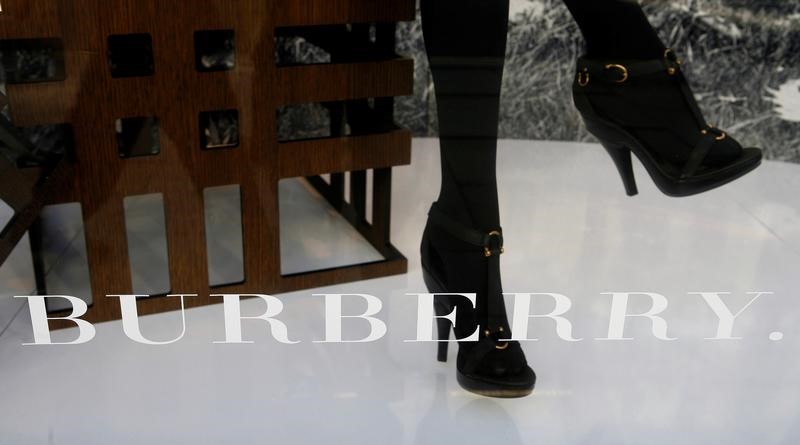Veeco launches Lumina+ MOCVD system, receives Rocket Lab order
Investing.com -- The global luxury sector is seeing a turbulence as analysts downgrade several major brands, citing a slowdown in key markets, especially China.
Shares of Kering (EPA:PRTP) and Burberry Group (LON:BRBY) fell by 3.2% and 5.1%, respectively, at 5:51 AM ET.
The once rapid luxury growth in China now appears to be facing structural challenges rather than just cyclical downturns, leading to sharp revisions in earnings forecasts and stock ratings for several key players, as per analysts at Barclays.
The Chinese economy, long a critical engine of growth for luxury goods, is under pressure from a combination of economic headwinds.
Property market instability, slower GDP growth, and weakened financial markets are squeezing disposable income, the primary driver of luxury consumption, said analysts at Barclays in a note.
Many of the factors that propelled Chinese consumers into the luxury market over the past decade are now faltering. In this environment, the luxury sector’s future in China looks increasingly uncertain, with brands reporting significant sales declines over the summer months.
Luxury sales in Mainland China have turned negative, with some brands seeing declines as steep as 50% during July and August. Amid this downturn, consumers are becoming more selective, and growth in the Chinese luxury market has all but stalled.
High-end VIP consumers, while somewhat insulated from the broader economic malaise, are also beginning to show signs of strain, as luxury demand weakens across all consumer segments.
As such, the outlook for luxury in China is dim, with recovery not expected until around 2027, when analysts anticipate Chinese luxury growth could return to more favorable levels.
In response to these findings, analysts have downgraded the stock ratings of two major luxury players, namely Burberry and Kering.
Burberry, despite being one of the weaker performers in the sector in recent years, faces even more downside risk. The brand is struggling to maintain its positioning as a high-end luxury label, and its inability to execute a disciplined full-price strategy has further eroded confidence.
“Burberry looks likely to turn loss-making for the first time in H1-25 and considering that we expect the environment to remain tough next year, it could be difficult to see margin recovery in the short term,” said analysts at Barclays.
As a result, Burberry’s stock has been downgraded to “underweight” from “equal weight”, with its price target down to GBP 540.
Kering, the parent company of several iconic luxury brands, is also facing significant challenges, particularly with its flagship brand, Gucci. Sales for Gucci have declined sharply in China, more than its competitors, and there is widespread skepticism about the impact of the brand’s latest product offerings.
The anticipated recovery for Gucci now seems delayed, with many analysts revising their expectations downward. Kering’s other brands, such as Saint Laurent, Bottega Veneta, and Balenciaga, are not expected to provide enough growth to offset Gucci’s struggles.
As a result, Kering has been downgraded to “underweight”, and its price target has been slashed to €210, reflecting an 11% potential downside.
These downgrades reflect broader concerns across the luxury sector. The summer’s sales trends were notably negative, with many brands in China reporting double-digit declines.
Analysts at RBC Capital Markets, who have downgraded Kering from “outperform” to “sector perform,” said, 'We believe the luxury environment is incrementally softening, which is likely to have an outsized impact on Gucci, as it transitions to a new design aesthetic while straddling both old and new product mixes.'"
The third quarter results are expected to be weaker than previously forecast, and many analysts are revising their expectations across the board.
The implications for the luxury sector are clear: growth will be muted for the foreseeable future. Analysts now forecast a sector-wide growth rate of only 4% in 2025, down from a previous estimate of 7%. In China, sentiment remains particularly poor, with flat sales growth considered the best-case scenario for many brands over the next year. Although travel is expected to recover somewhat, boosting sales to Chinese tourists abroad, domestic demand is unlikely to recover meaningfully until the latter half of the decade.
At the same time, the luxury sector is becoming increasingly polarized. Brands with strong equity and deep connections to high-end consumers, such as Hermès, Louis Vuitton, and Brunello Cucinelli, are likely to weather the storm better than others.
These brands, which have successfully cultivated exclusivity and desirability, remain top-of-mind for wealthy consumers, even during downturns. Conversely, brands that are undergoing transitions or have weaker brand positioning, such as Burberry and Gucci, are at greater risk of losing market share.
In light of these developments, analysts have revised their price targets for a number of major luxury brands. LVMH (EPA:LVMH), while still performing better than most, has seen its price target cut to EUR 795 from EUR 860.
Richemont, the parent company of Cartier and other luxury brands, has had its target reduced to EUR 150 from EUR 164. Hermès, a perennial high performer, has had its price target trimmed slightly to EUR 2,220 from EUR 2,260, reflecting cautious optimism about its future growth prospects. Moncler and Prada (OTC:PRDSY) have also seen minor reductions in their price targets, reflecting the broader slowdown in the market.
For brands facing more significant challenges, the cuts have been more severe. Ferragamo, which has been struggling with brand relevance, saw its price target reduced to EUR 6.9 from EUR 7.2. Swatch, which operates in the highly competitive luxury watch sector, had its target cut to CHF 145 from CHF 153.
Overall, the outlook for the luxury sector remains uncertain. While the sector has historically been resilient during economic downturns, the structural challenges emerging in China, combined with global macroeconomic headwinds, suggest that growth will remain subdued in the near term.
Brands that have built strong, exclusive identities are better positioned to navigate this environment, but even they are not immune to the broader slowdown.
